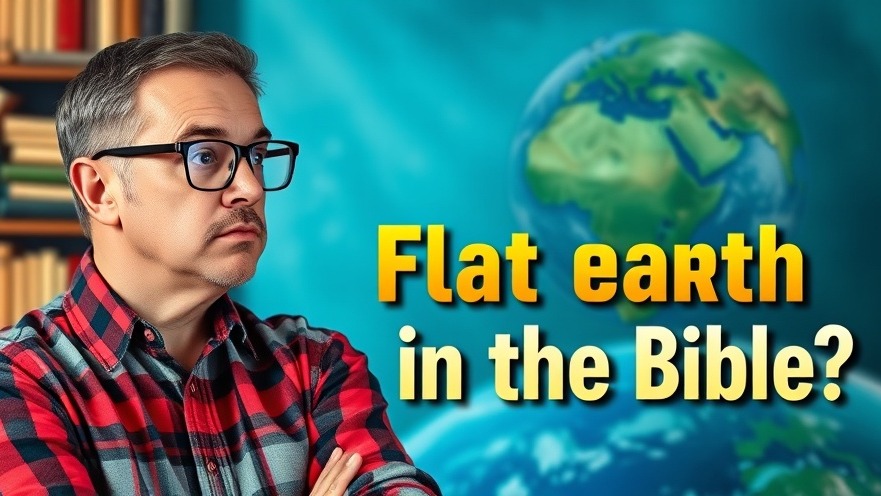
Faith Versus Atheism: Understanding the Foundation of Belief
The video titled The Folly of Atheism, The Necessity of Faith dives deep into an important conversation between Dr. Nathan Hawkins and a host about the relationship between faith, reason, and evidence. At its core, the dialogue positions faith not merely as an alternative view to atheism but as a fundamental aspect of human experience that shapes our understanding of truth, beauty, and morality.
In The Folly of Atheism, The Necessity of Faith, the discussion dives into the essential interplay between faith and reason, exploring key insights that sparked deeper analysis on our end.
Why Faith is Integral to Our Worldview
Dr. Hawkins argues that the scientific method, while invaluable, does not encompass the entirety of human experience. There are aspects of life—consciousness, morality, and free will—that transcend empirical evidence. This viewpoint brings to the forefront the philosophical notion that foundational beliefs often rest upon forms of faith that are not easily articulated or substantiated by hard evidence. For example, when Dawkins and Harris criticize faith as a delusion, they overlook the assumptions underlying their own assertions. They too must rely on a kind of faith to support their frameworks, which prompts a reflection on the role of faith even in materialistic viewpoints.
The Intellectual Satisfaction of a Faith-Based Framework
Hawkins suggests that a satisfying worldview must integrate all dimensions of human experience, including the subjective. Just as scientific inquiry probes the physical universe, philosophical inquiry addresses moral truths and experiences of beauty. Hence, rather than seeing faith and reason as oppositional, Hawkins positions them as deeply interwoven—a necessary balance that enables a coherent understanding of our lives and the universe.
The Moral Implications of Atheism
One of the most compelling aspects of the video is Hawkins’ exploration of morality within atheism. He challenges the notion that atheism can provide an adequate moral framework, which traditionally is rooted in a belief in a higher divine standard. While atheistic thinkers such as Sam Harris assert that morality can be derived through a rational understanding of human well-being, Hawkins questions the underlying faith assumptions that must also be accepted for this moral calculus to hold. Without a divine reference point, as Hawkins articulates, the basis for what constitutes 'good' and 'evil' becomes murky.
Consciousness and Free Will: Are They Illusions?
In another focal point of their discussion, the video examines whether free will and consciousness could indeed be illusions, as posited by certain atheistic philosophers. Hawkins argues that insisting upon a deterministic worldview ultimately overlooks the lived experience of agency and moral choice, both crucial to human identity. His perspective reveals that dismissing these experiences as mere illusions can detract from an understanding of what it means to be human.
Philosophical Inquiry: Rediscovering Meaning
The dialogue reinforces the idea that philosophical inquiry serves to enrich our faith and is not a barrier to it. Especially for young people or those in academic environments, where skepticism often reigns, understanding the role of faith brings assurances that exploration and belief can coexist harmoniously. Hawkins encourages viewers to engage deeply with both philosophical texts and their own experiences to find connections that enhance their faith rather than diminish it.
Re-assessing the Role of God in Human Existence
Hawkins also ventures into the discussion of divine hiddenness, challenging the perceptions of a distant or uninterested deity. By understanding God’s intimate involvement in the world, believers are invited to re-examine the nature of suffering and the purpose of their existence. Exploring how divine suffering parallels human experience offers rich theological insights.
Andrew Peterson's Influence on Modern Thought
As the discussion closes, Hawkins highlights the relevance of contemporary thinkers like Andrew Peterson, who emphasizes that behind scientific discovery lies the need for a value-oriented view underpinning our experiences in justice, love, and morality. This perspective nurtures a richer understanding of existence that embraces the complexities of faith amidst skepticism.
In conclusion, this conversation with Dr. Nathan Hawkins serves as an invitation for individuals to rethink the necessity of faith in a world increasingly tempted by atheistic materialism. By engaging with profound philosophical discourse, believers can strengthen their faith, find common ground with skeptics, and cultivate a holistic understanding of reality informed by both reason and belief. I encourage readers to explore similar discussions and to consider subscribing to Nathan Hawkins’ channel for further insights that resonate with both heart and mind.
 Add Row
Add Row  Add
Add 








Write A Comment